Turquoise, the greenish-blue color that takes its name from the ornate gem, is believed to create a feeling of calm and well-being. Turquoise is touted as a great color to revive interiors, but how about our gardens? Turquoise is one of the most vibrant colors, and it has the ability to put energy into a space but also, with its connotations of blue skies and tropical beaches, to create feelings of stress-free escape. Let’s look at some examples of how we can use it to make a splash in our garden designs.
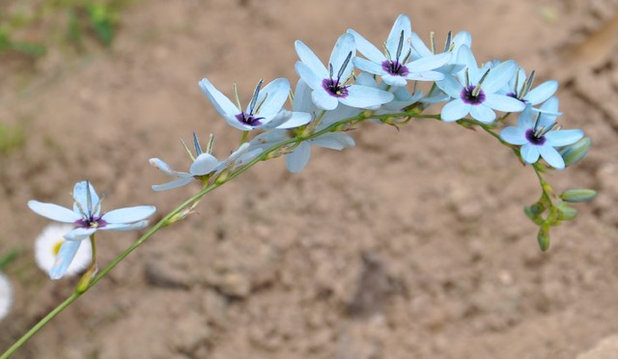 Photo by Jean-Michel Moullec
Photo by Jean-Michel MoullecTurquoise is a versatile color; its tones and colors can be bright and vibrant or cool and calming. But for the garden designer, turquoise can be challenging to use.
Very few plants have true turquoise flowers or foliage. Turquoise ixia (
Ixia viridiflora,
USDA zones 9 to 11; find your zone), shown here, is a South African species with near-turquoise flowers. Porcelainberry vine (
Ampelopsis brevipedunculata, zones 5 to 8) holds turquoise berries after flowering but is considered invasive throughout much of the U.S.
Designers tend to look for other ways to incorporate turquoise into their designs, using the color on decorative features, furniture and accessories.
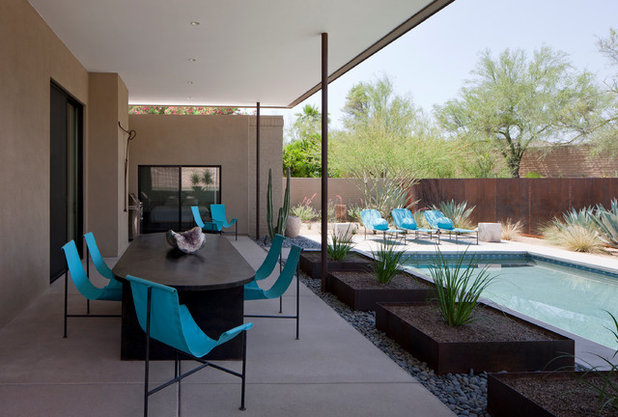
Ibarra Rosano Design Architects
Adding colorful furniture is one of the simplest ways to liven up the garden, and of all the colors, turquoise was made for the task. This neutral Southwestern garden filled with Cor-Ten and the colors of the desert is brought to life with vivid turquoise furniture by Ron Mann Design. Glaucous succulents echo the bluish hues.
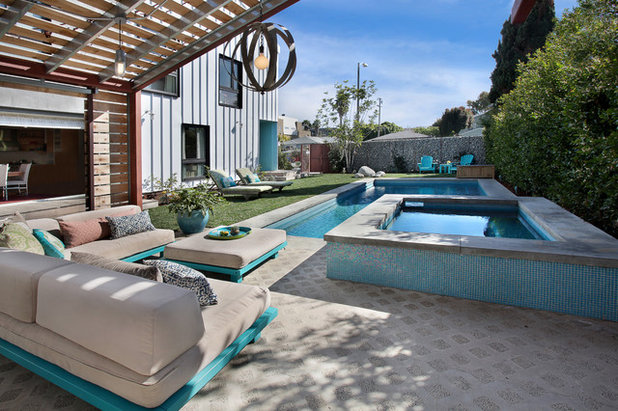
Jeri Koegel Photography
Most colors would dominate a scheme when used throughout a design in the way that turquoise has been used here. On the furniture and various accessories it links beautifully with the tiled pools, creating a great feeling of calm and tranquility.
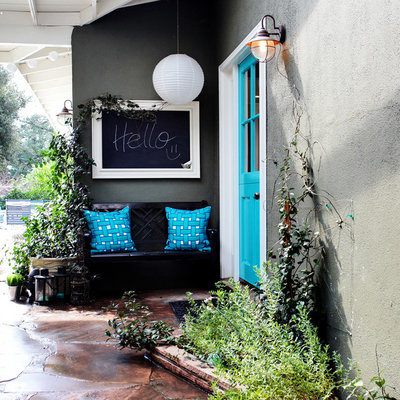
S / Wiley Interior Photography
Even small touches of turquoise can make a difference. The turquoise cushions and front door mix with the dark charcoal exterior to create a truly modern entry here.
See 8 ways with turquoise and blue front doors
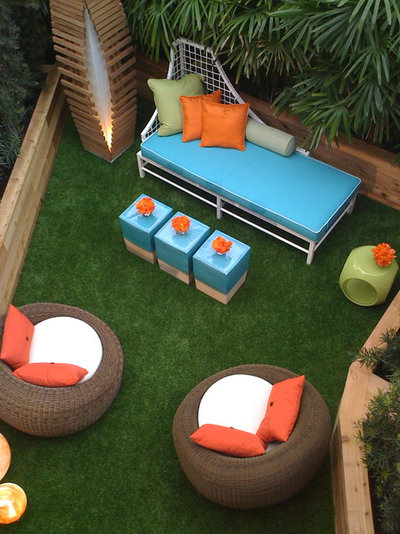
Turquoise is not generally found on color wheels, but it is nestled between the greens and blues on the cool side of the wheel. This means that its complementary colors, those that make it stand out, are the warmer colors on the opposite side of the color wheel — especially the oranges and terra-cotta.
You can see here how the turquoise cushions really get some zing from the warm terra-cotta hues and bright orange cushions and accessories. The same effect can be achieved with selective plantings, using brown and neutral choices such as grasses and sedges, as well as bright pink and red flowers or bedding plants.
See how to use orange in the garden
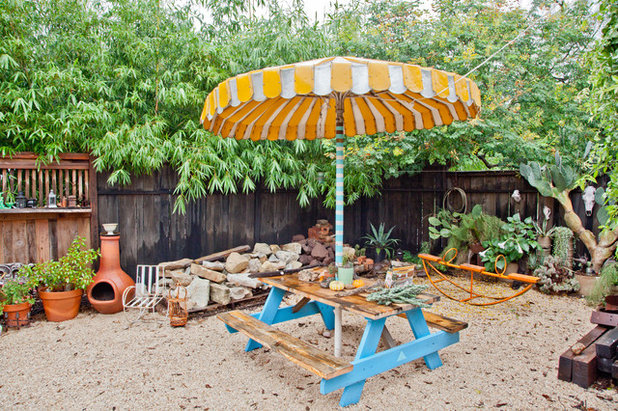
Sarah Natsumi Moore
Even in simple garden spaces like this one, using turquoise with complementary colors can bring the area to life.
See more of this funky home and garden in Austin, Texas
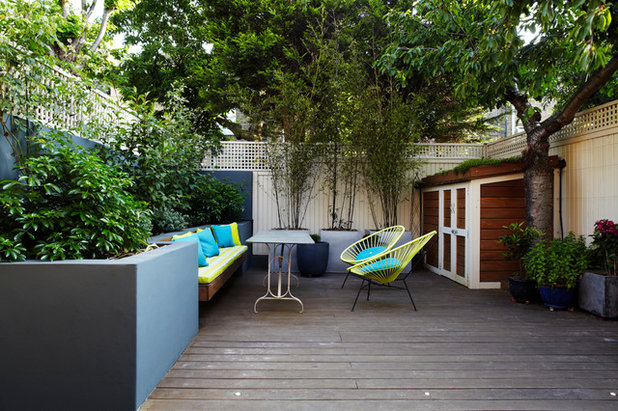
Chantel Elshout Design Consultancy
Here turquoise is mixed with bright yellow, a near-complementary color, to bring the best out of both colors. Yellow and yellow-green plants — sunflowers, tickseed (
Coreopsis spp), black-eyed Susan (
Rudbeckia hirta) — also enliven turquoise in the same way.
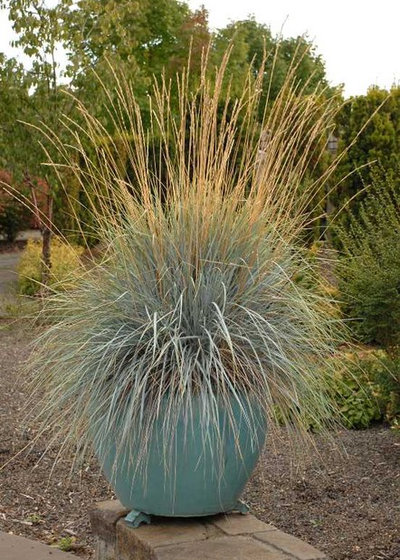
Missouri Botanical Garden
Turquoise, as we’ve seen with garden furniture and accessories, commands attention when in the company of its complementary colors — reds, oranges and browns. It also comes to the fore with bright colors such as magentas and pinks.
Evoking visions of tropical beaches, turquoise also combines well with the water colors of greens and blue. Here blue oat grass (
Helictotrichon sempervirens,
zones 4 to 8) provides color benefits both of dusty blue and of turquoise’s favorite playmate, terra-cotta. Curly top sedge (
Carex buchananii,
zones 6 to 9), with its light brown foliage, is also a great grass to pair with turquoise.
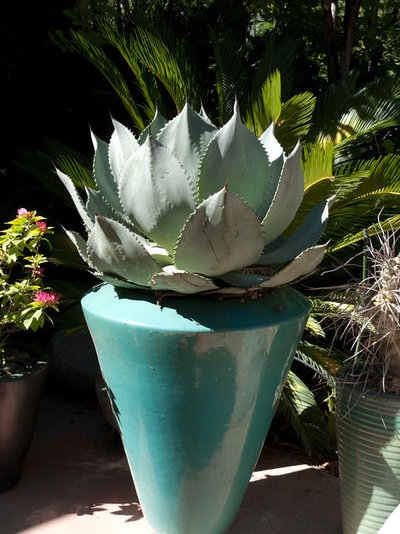
Le jardinet
Glazed turquoise containers can help introduce the color into even the smallest gardens. They provide accents within the overall design, either as single focal points or in groupings of differing sizes and shapes.
As I’ve mentioned, there is a dearth of turquoise-colored plants, but many other plant colors harmonize with turquoise containers, from neutral browns and creams to cool blues to hot reds and pinks. This container has a single Parry’s agave (
Agave parryi).
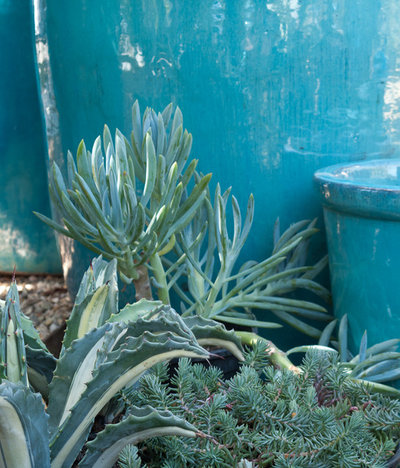
Le jardinet
Some plants, especially succulent species, have foliage that comes very near to turquoise. This beautiful arrangement of glaucous foliage is really linked with the high glazed pots behind. The plants shown here, from left to right, are variegated agave
(
Agave americana ‘Mediopicta Alba’, zones 8b to 11), blue chalk fingers (
Senecio mandraliscae,
zones 10 to 11) and Blue Spruce sedum (
Sedum rupestre ‘Blue Spruce’, zones 3 to 11).
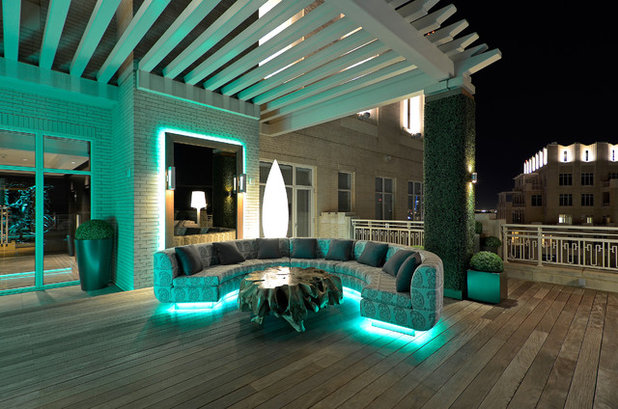
Harold Leidner Landscape Architects
Lighting can effectively add color to a garden without the commitment to a permanent solution. Here turquoise light is used in selective places to create a stunning effect. The landscape architect attached weatherproof segmented LED strip lights on the sofa’s underside.
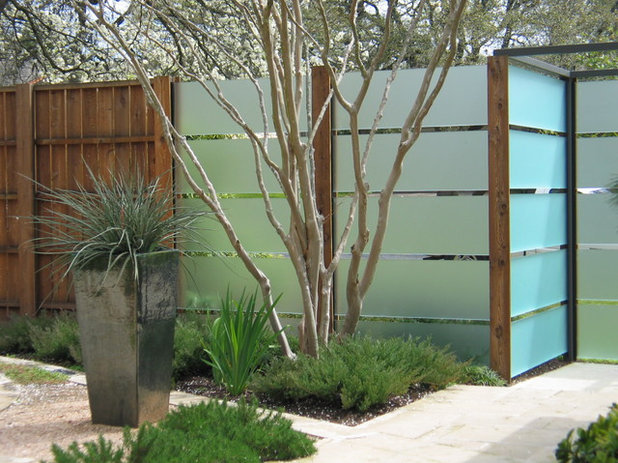
Tim Cuppett Architects
Though not truly turquoise, this frosted glass creates the illusion of being turquoise by picking up the blue in the sky. Imagine how different the scene would be if the planted container were vibrant turquoise.
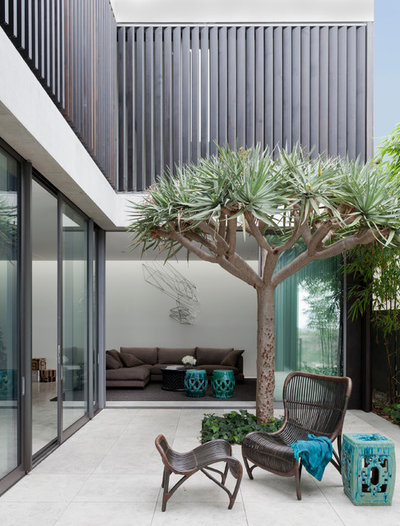
Madeleine Blanchfield Architects
Even in minimalist modern gardens, surely there is a place for turquoise to work its magic. Here there may be no sign of turquoise’s vibrant green side, but its serene blue is brought to the fore with the beautiful choice of the greenish-blue foliage and neutral-colored furniture.
More: 5 Tips for Choosing a Primary Outdoor Color





